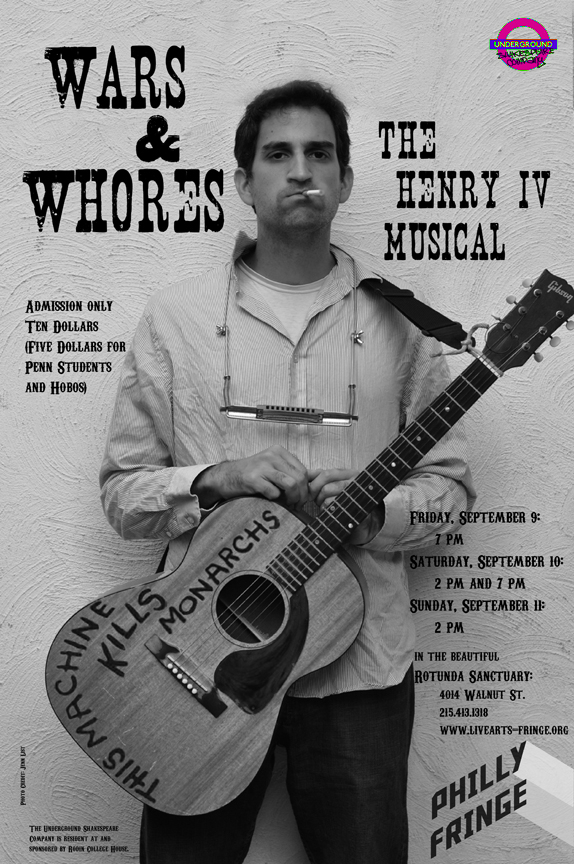 BY BRANDON LAFVING FRINGE CORRESPONDENT I have always wanted to rip that stiff-necked Victorian collar right from under Bill Shakespeare’s chin, you know, just to let the man breathe, let loose and have a bit of fun. These sentiments seem to be shared by the Underground Shakespeare Company, which presented its own new and improved adaptation of Henry IV in the Philly Fringe this year with musical interludes, cheap sex, and bloody brawls that punctuate the original script with bawdy home-on-the-range, goodness. This is not the first production of the Underground Shakespeare Company, which was founded in 2001 by Akiva Fox and Nigel Caplan at the University of Pennsylvania. The company’s ethos, first and foremost, is to present great adaptations of Shakespearian plays, and second, to put on a great show that audiences can relate to and, I am happy to report, Wars & Whores: The Henry IV Musical is no exception.
BY BRANDON LAFVING FRINGE CORRESPONDENT I have always wanted to rip that stiff-necked Victorian collar right from under Bill Shakespeare’s chin, you know, just to let the man breathe, let loose and have a bit of fun. These sentiments seem to be shared by the Underground Shakespeare Company, which presented its own new and improved adaptation of Henry IV in the Philly Fringe this year with musical interludes, cheap sex, and bloody brawls that punctuate the original script with bawdy home-on-the-range, goodness. This is not the first production of the Underground Shakespeare Company, which was founded in 2001 by Akiva Fox and Nigel Caplan at the University of Pennsylvania. The company’s ethos, first and foremost, is to present great adaptations of Shakespearian plays, and second, to put on a great show that audiences can relate to and, I am happy to report, Wars & Whores: The Henry IV Musical is no exception.
Wars and Whores is a coming-of-age story that follows the Prince of Wales, played by Gary Kurnov, through the difficult period of transition to the throne. In his way stands, well, mostly himself. While Henry IV, his father, hears news of a rebellion brewing in the north, Prince Hal parties in a local saloon,  where the unabashed barmaids are bold, and very friendly. As war becomes increasingly imminent, the prince must choose either to continue living his life of leisure or embrace his destiny. The clever musical numbers, composed by Jeffrey Barg, were inspired in large part by traditional American folk ballads, such as “This Land is Your Land,” and “She’ll Be Coming Round the Mountain When She Comes.” Lyrics were changed to suit the plot lines, but songs were similar enough to their templates that I wanted to sing along with them.
where the unabashed barmaids are bold, and very friendly. As war becomes increasingly imminent, the prince must choose either to continue living his life of leisure or embrace his destiny. The clever musical numbers, composed by Jeffrey Barg, were inspired in large part by traditional American folk ballads, such as “This Land is Your Land,” and “She’ll Be Coming Round the Mountain When She Comes.” Lyrics were changed to suit the plot lines, but songs were similar enough to their templates that I wanted to sing along with them.
The show was presented in the circular, domed sanctuary of the Rotunda, a gorgeous, but sadly neglected structure that turned 100 this year. The company used the massive, ornate chandelier that long ago snapped the chain that hoisted it overhead and has lived forever since on the floor of the Rotunda as a de facto and oddly effective backdrop. At one point, Prince Henry speaks at his friend who is ‘backstage,’ behind the chandelier, having his way with a lady of the house.
The show was far from perfect, but its flaws and quirks made it all the more personable. One disadvantage of the space was that actors’ and actresses’ voices reverberated around the hall, and sometimes speech was confused by the echo. On occasion, a player would stumble in the middle of a speech, and so on. The beginning of the performance saw some awkward transitions to song, as the players warmed up to their roles. This was not a streamlined performance, but neither was it meant to be. In fact, part of the Underground Company’s ethos is to give its cast little prep time to present works in progress and this usually worked in the show’s favor. Overall, the company did a great job with its shoestring budget. Everyone in the company clearly loved what they were doing, which was inspiring to watch, and the randy sense of humor made the text feel modern and approachable. Wars and Whores, was a fun ride, indeed.
